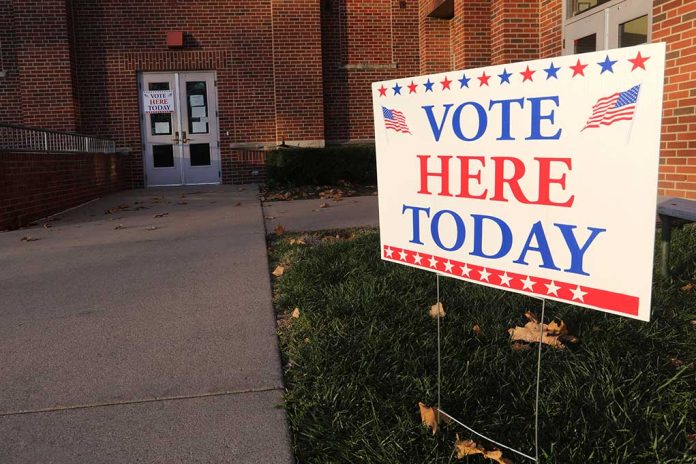
Republicans, bolstered by Trump’s influence, are pushing for sweeping voting reforms that could reshape America’s electoral landscape.
At a Glance
- Republicans aim to overhaul U.S. voting procedures with stricter voter ID and citizenship requirements
- The American Confidence in Elections Act (ACE) and Safeguard American Voter Eligibility Act (SAVE) are key proposed legislations
- GOP argues these measures are necessary to restore public confidence in elections
- Democrats oppose the reforms, claiming they restrict voting rights
- Election officials warn against moving to a single day of voting
Republican Push for Voting Reform
With control of the White House and Congress, Republicans are seizing the opportunity to implement significant changes to America’s voting procedures. The focus of these reforms centers on enforcing stricter voter ID requirements and demanding proof of citizenship, policies aimed at bolstering election security and curbing potential fraud.
Two key pieces of legislation at the forefront of this initiative are the American Confidence in Elections Act (ACE) and the Safeguard American Voter Eligibility Act (SAVE). These bills represent the GOP’s legislative focus on election integrity, seeking to build confidence in the voting system.
Republicans push for major voting changes, including voter ID and proof-of-citizenship, sparking debate over election trust and integrity. https://t.co/yuEFC9UQy4
— WUSA9 (@wusa9) December 26, 2024
The Case for Reform
Republicans argue that these measures are necessary to restore public confidence in elections, which they claim has eroded in recent years. The SAVE Act, which has passed the House but stalled in the Democrat controlled Senate, requires proof of citizenship for voter registration. GOP lawmakers contend that the current voter registration process relies too heavily on an “honor system” and lacks sufficient stringency.
Republican Rep. Bryan Steil, who chairs the Committee on House Administration, which handles election-related legislation, is a key proponent of these reforms and emphasizes the importance of this moment. “As we look to the new year with unified Republican government, we have a real opportunity to move these pieces of legislation not only out of committee, but across the House floor and into law. We need to improve Americans’ confidence in elections,” Steil stated.
Georgia Secretary of State Brad Raffensperger, a proponent of voter ID and proof of citizenship requirements, credits his state’s systems for maintaining accurate voter lists. Georgia has conducted audits to verify voter citizenship, finding few cases of noncitizen voting.
Opposition and Concerns
Democrats vehemently oppose these measures, arguing that they restrict voting rights and create unnecessary barriers to the ballot box. They advocate for federal funding for election offices and limiting foreign money in U.S. elections as alternative approaches to ensure election integrity.
“Our view and the Republicans’ view is very different on this point. They have spent most of the time in the last two years and beyond really restricting the rights of people to get to ballots – and that’s at the state level and the federal level. And the SAVE Act and the ACE Act both do that – make it harder for people to vote,” said Democratic Rep. Joe Morelle.
Critics of the GOP’s claims of widespread noncitizen voting point out that such allegations have diminished post-election. Moreover, election officials warn against moving to a single day of voting, a proposal of Republicans, as it would eliminate early voting and limit mail ballots, potentially creating logistical challenges and reducing voter turnout.
State-Level Successes and Recommendations
Some state officials suggest looking to successful practices already in place for potential voting reforms. Georgia’s audits, for instance, found minimal noncitizen voting, supporting the effectiveness of current verification processes.
What we’ve done by doing those audits is give voters confidence that we do not have noncitizens voting here in Georgia. And when society is highly polarized, you have to look at building trust. Trust is the gold standard,” Raffensperger explained.
Both Georgia and Michigan officials highlight the security and accuracy of elections in their states, emphasizing that existing systems are already effective in maintaining election integrity. Michigan Secretary of State Jocelyn Benson opposes moving to a single voting day, advocating for the continuation of early and mail voting options.
Looking Ahead
As the debate over voting reforms continues, the outcome will likely have significant implications for future elections. With Republicans having gained a slim but unified control of government, the passage of these reforms could reshape the electoral landscape. However, the contentious nature of these proposals suggests that any changes will face intense scrutiny and potential legal challenges.









